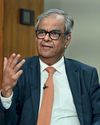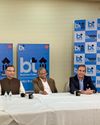N. Chandrasekaran is doing his best to restore normalcy at the Tata Group after the acrimonious exit of Cyrus Mistry. But his problems are many.
Natarajan Chandrasekaran had no choice. An avid marathon runner, he has had to change his pace and break into a sprint from the moment he was elevated from chief executive officer and managing director of Tata Consultancy Services (TCS) to chairman of Tata Sons in February this year, effectively making him the head of the Tata empire. The unceremonious removal of Cyrus Mistry last October had sent shock waves across the vast federation of the 100odd Tata Group companies, which the brief, temporary return of Ratan Tata as his successor did little to quell. Chandrasekaran knew he had to get a lot done quickly to overcome pain points and bring back calm.
His first step was to restore communication with other board members which had practically broken down with Mistry at the helm. It is said in Tata Group circles that Mistry had virtually stopped talking to Ratan Tata towards the end of his truncated term, and that, when he presented the Tata Sons board with two of his most important decisions – the first, to exit Tata’s entire steel business in UK which had been bleeding, and the second, to buy the Welspun Group’s complete renewable energy portfolio for ₹10,000 crore – he was met with stony silence.
Accordingly, Chandrasekaran has already held three board meetings in his four months in office, against Mistry having convened just eight through all of 2015/16. He has also made it amply clear where his loyalties lie, ignoring all the charges Mistry levelled against the Tata Group after his ouster. Indeed, in a letter to Tata employees, he called Ratan Tata “an inspiration for all of us in the group”, adding that he looked forward to working closely with him and “taking the group forward in the same spirit”.
Change in the Air
Diese Geschichte stammt aus der July 30, 2017-Ausgabe von Business Today.
Starten Sie Ihre 7-tägige kostenlose Testversion von Magzter GOLD, um auf Tausende kuratierte Premium-Storys sowie über 8.000 Zeitschriften und Zeitungen zuzugreifen.
Bereits Abonnent ? Anmelden
Diese Geschichte stammt aus der July 30, 2017-Ausgabe von Business Today.
Starten Sie Ihre 7-tägige kostenlose Testversion von Magzter GOLD, um auf Tausende kuratierte Premium-Storys sowie über 8.000 Zeitschriften und Zeitungen zuzugreifen.
Bereits Abonnent? Anmelden

"Inaction is worse than mistakes"
What was the problem you were grappling with?

TEEING OFF WITH TITANS
BUSINESS TODAY GOLF RESUMES ITS STORIED JOURNEY WITH THE 2024-25 SEASON OPENER IN DELHI-NCR. THERE ARE SIX MORE CITIES TO COME

AI FOOT FORWARD
THE WHO'S WHO OF THE AI WORLD GATHERED AT THE TAJ MAHAL PALACE IN MUMBAI TO DELIBERATE THE TRANSFORMATIVE IMPACT OF AI ON INNOVATION, INDUSTRIES, AND EVERYDAY LIFE.

Decolonising the Walls
ART START-UP MAAZI MERCHANT IS ON A MISSION TO BRING INDIA'S FORGOTTEN ART BACK HOME

"I'm bringing Kotak under one narrative, one strategy, one umbrella”
Ashok Vaswani is a global banker who spent most of his career overseas at institutions like Citi Group and Barclays, among others.

CHOOSING THE CHAMPIONS
The insights and methodology behind the BT-KPMG India's Best Banks and NBFCs Survey 2023-24.

'INDIA IS AT AN EXTREMELY SWEET SPOT'
The jury members of the BT-KPMG Survey of India's Best Banks and NBFCs discuss developments in the banking sector and more

FROM CRISIS TO TRIUMPH
Dinesh Kumar Khara stewarded SBI through multiple challenges during his tenure, while ensuring that profits tripled, productivity soared, and the bank consolidated its global standing

AT A CROSSROADS
BANKS ARE FACING CHALLENGES ON BOTH SIDES OF THE BALANCE SHEET-ASSETS AS WELL AS LIABILITIES-WHICH ARE PUTTING PRESSURE ON MARGINS.

EXPANSIVE VISION
Bajaj Finance, an outlier in terms of digitisation, faces stiff competition. But it continues to expand its reach